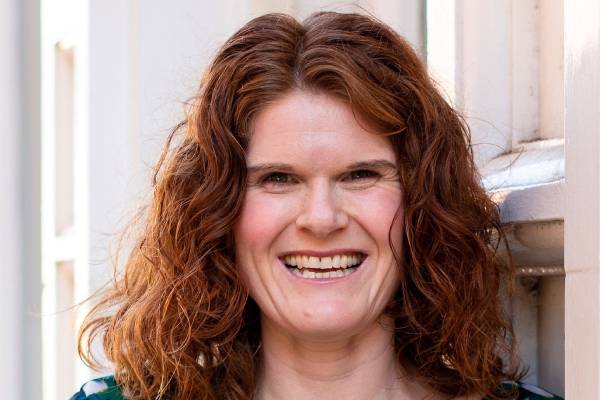Authored by Certified Business Psychologist Laura Howard. Certified Business Psychologist, Laura Howard, reflects on the webinar she recently delivered to ABP members. Below she outlines the main findings of her published research uncovering systematic barriers women face when being authentic as leaders. Importantly, she gives…

The Manchester Careers Event has now been run every year at Manchester Metropolitan University since 2017 and has proved to be a popular event. Because of the current health emergency it was decided to run the event as a webinar on 25th March involving five speakers from the Manchester area. They were predominantly from the ABP Manchester committee group.
Marilena Antoniadou
Manchester Metropolitan University
Marilena is the programme lead at Manchester Metropolitan University in their BA Business Psychology Programme along with being a senior lecturer in management at the Management School.
For Marilena, Business Psychology is a discipline which equips you for many careers in management as it focuses on human behaviour and how it can impact on the effectiveness of organisations. While traditional management consulting is more transactional in nature, business psychology addresses the issue of how people can be made to be more effective as individuals and in teams. With the UK in a productivity crisis, more and more organisations are looking to Business Psychologists to provide the spotlight on innovative solutions. Specifically, Business Psychology allows you “Access All areas” pass into key business issues:
- Increase business efficiency
- It addresses mental health issues and assesses the mental health and work performance of employees.
- Consumer behaviour to improve marketing and increase sales
- It’s approach allows an evidence based approach to the development of training and leadership programs
Business psychology is all around us; nowhere is this more in evidence than in the video games industry where psychologists are being increasingly employed in development programmes to make games even more compelling, challenging and fun. It is used to maximise team effectiveness in high pressure environments, such as in space missions, where setting the conditions can mean the difference between success and failure.
Graduates go on to careers in the public sector, where psychology is now recognised as a discipline in its own right, and the public sector, where there are opportunities for self employment, working with business psychology organisations, and working as part of a larger multi-disciplinary team in medium to large sized enterprises.
The MMU route is typical of many of the programmes available nationally and is a three year programme, extendable to four years with overseas placements / study. For further information contact Marilena on m.antoniadou@mmu.ac.uk
Robin Hills
Unlike the other speakers Robin Hills has focused more on Emotional Intelligence in his career. Just as we are witnessing growth in areas such as Artificial Intelligence and Virtual Reality, EI is now maturing into an accepted area of psychology..
Ten years ago, no one had heard of Emotional Intelligence, as evidenced by his degree certificate which describes his discipline as “Biology (Physiology)” but even though it is relatively new it is now almost mainstream. A concept which was always an issue yet not formally acknowledged has now been formalised and buyers of consulting services identify it as a need.
Robin also developed a career in psychology by switching after a spell in a commercial career. When he left University he became a Medical Sales Representative. He found that when visiting London Teaching Hospitals he could influence, persuade and even change behaviour by spending time with the medical professionals. He concluded that he was using emotions to influence and was in fact using the new and developing activity called emotional intelligence.
After redundancy, he looked at a career in clinical research but found that there was a growing need for Resilience training and a shortage of products for trainers to use. Organisations needed to train people to bounce back and be more resilient as part of their personal development programmes, so he set about to develop these programmes.
In order to gain credibility he identified the need to have published material, so he wrote and had published a couple of books, on resilience and emotional intelligence.
He coupled this with online training and, promoting the books and training material
online, he now has an international business which has clients in over 169 countries and translated into 45 languages. Other publications include:
* Communication skills: Personality and Behaviour in Business
* Inclusive Leadership: working with Equality and Diversity
* Collaboration and Emotional Intelligence
* Understanding Personality Types at Work
What he found surprising was the extent to which the published material opened doors, especially since his work has become recognised by the Institute of Leadership and Management (ILM). He is now in constant demand as a speaker and he has sold more than 31000 courses on line which are use in areas as diverse as MBA apprenticeships programmes and the NHS and many private sector organisations. He is now training in
* Developing emotional intelligence in Teams
* Collaboration and EI
* EI Leadership
* Conflict Management and Emotional Intelligence
Alongside using networking to promote yourself and building your brand he recommends that you
* Get competent in Social Media
* Develop skills in emerging technologies – videography, sound engineering. and Animation to fully utilise the social media skills.
His message: don’t be afraid of trying something new and keep persevering.
Dr. Jodi O’Dell
Engage Coach
Dr Jodi O’Dell has built up a niche business in Coaching Psychology and through hard work, dedication and attention to evidence based activity, she has a loyal and increasing client base. However, on her own admission, success has been achieved the hard way and through an unorthodox route.
Following her first degree in French and Anthropology, she took an MSc in Occupational Psychology and a few year later after developing some work experience embarked upon her PhD.
After her MSc she took the unusual step of working as a freelancer and built up a business with two colleagues. Her coaching practice increased and after attending networking events with EMCC and Association for Coaching, she became increasingly aware of the lack of evidence based coaching research being carried out. This prompted her to undertake her PhD to increase the robustness of her work and to accelerate her career where her skills would be more differentiated.
During her PhD juggling homelife and bringing up a family with a regular client project in the Far East was not without its challenges. She struggled to find work in her native Manchester: hard work and dedication proved to be worthwhile as she graduated with her PhD in Coaching Psychology. Over the past 10 years she has developed a diagnostic (Engage) which measures ‘mindset’ and ‘change readiness’. Her business has evolved from a consultancy led practice to include a product which facilitates change and business performance using a more rigorous evidence based approach. A career which started with profiling in assessment centres has progressed to the point where she is now being approached by large multinationals to pilot her product.
How has the market changed?
* Large consulting firms have taken over smaller companies.
* Clients now want to know how “personality” has an influence on outcomes
* Clients want help with broader issues involving change and the need for transformation. How can they make their organisations and their employees more “Agile”.
* Gamification is having a big influence on the market as it is a cost effective, detailed and remarkably accurate way to assess individuals in different scenarios. The use of AI can provide ever more detailed analysis of data
What is involved in the work of an Occupational Psychologist? It is hugely varied but includes:
* Mixed exercises – including workshop design and measurement of behaviour
* Interviews
* Gathering data and preparing presentations
* Executive coaching. These involve, especially at senior level, a series of face to face sessions. Increasingly these are carried out through web conferencing.
* Leadership programmes.
* Strategic Workshops and OD. These involve change management and transformation. She had been involved in a large design project with the NHS.
What has she learned from her approach to work?
- Working on your own provides the opportunity to respond to real life opportunities, giving autonomy and flexibility, however, it is not for everyone and being “comfortable” with uncertainty and lean periods is essential
- Working on assessment centres is a good way to network and develop profiling and other relevant skills
- Developing a freelance business relies heavily on your ability to network and promote yourself, as much as it is about offering a quality service as a psychologist
- If you want to work towards chartership, it can be extremely helpful to work within a larger consultancy to get varied exposure to different aspects of psychology work. However, a PhD and relevant experience has proved to just as, if not more valuable, than chartership.
- Within coaching work, purchasers are becoming increasingly discerning often requiring coaching qualifications, however, developing a log of ‘coaching hours’ is essential
- Be mindful of increasing reliance on the use of technology. Over 20 years the amount of travelling has decreased with Skype and similar platforms becoming popular for use in coaching sessions. It is important to know the limitations of technology when identifying desired outcomes.
- Most important of all, use every networking opportunity at your disposal
Anna Whitehead
Anna has developed a career along a different route. With a psychology degree she decided to go into the Public Sector in an Organisational Development (OD) type role and more recently she took a coaching diploma and now undertakes coaching assignments and other varied roles, including being Chair of a Board of Trustees of a Charity.
In terms of using her Psychology degree there are two main areas of skills:
* Challenging Assumptions. Management failures occur when processes and communication break down. These happen most frequently during periods of change. When immersed in a culture where initiating change can be met with resistance, a psychology training can equip you to be confident and comfortable when challenging assumptions. This is why it is such a good training for a management role, where success can be determined by how effective you are at challenging.
* Gathering and evaluating evidence. A psychology degree, like many science and related disciplines can train in systems thinking (making connections between concepts) and the managing, gathering and interpretation of data. Using systems thinking in the workplace involves gathering and using information to look at new ways of working.
It trains you to view principles in a fresh light, enabling you to test, evaluate and apply to see whether they can be made to work. You need to be then able to adapt and evolve these principles, especially as the organisation changes and evolves and the elements need to be scaled up.
Some areas where she has usefully applied the training are:
* Health and Social Care needs. There are always opportunities for improvement, but the success of any initiative depends on decisions as to how services should be delivered. Questions need to be asked, such as
– what is the aim of the project
– where can the data be obtained
– what sort of data needs to be gathered
– how can the data be used
* Statistical Process Control Charts. These are essential for the successful monitoring of projects. A rigorous training in Psychology includes a grounding in using and interpreting statistics.
* Focus on people and their “inner world”. This means digging beneath the superficial and focusing on individual elements such as fears, apprehensions, and natural preferences.
Most people after graduating do not have a clear vision of their career path. Anna tried teacher training, and it did not work for her, but it helped her to realise that she wanted to work with people and processes, while working with the logical and the analytical.
Having worked as an internal consultant, Anna crystallised in her own mind the difference between internal and external consultancy. Working internally involves being part of a team. It is a more secure and collaborative environment and it is easier to figure out dynamics, and effect gradual change. However, working independently means you are outside the hierarchy which can give you a greater degree of influence and can allow you to walk away more easily. This choice can form a critical element of you career preference.
In summary, when choosing a career path, don’t just focus on the options available but consider what is important to you, the strengths and skills you want to use and, crucially, what will “A Good Career” look like to you.
Julia Norman
JFN Consulting
Julia works primarily on the design and delivery of Assessments Centres and related areas of work She works on back of house programmes involving Recruitment, Selection, Develop and Retention. She has to devise Role Plays, and psychometric assessments and reports.
However, the work inevitably involves related areas: these involve Competency Framework design, 360 feedback interview guides, leadership course design, along with associated in house coaching and management training.
How did she get into this work? After completing an engineering degree she preferred being around people and chose commercial work. She sold consumer products for several years, being promoted to manager of a team of salespeople.
A career change took her through a distance learning diploma and then along the MSc route to a psychology degree after which she joined SHL, a large profiling and psychometric testing organisation. Realising that a “Stamp of Approval” was required for undertaking certain kinds of work, especially in the public sector she went through the process of BPS Chartership. After several years she had sufficient contacts and experience to become independent and developed delivery/design skills through working for herself. On her own admission, however, going independent has been biggest challenge in her career.
She now has a portfolio of local, national and international work and is very busy. A breakdown of her work includes
* Psychologists in the area of High Level/High Value Recruitment
* Assessment Centres. Because of cost pressures these are now increasingly run virtually.
* Psychometrics. This area taps into the potential for individual development and can assess team and communication skills. However, psychometrics can only reveal so much
* Gamification. This started out as simple role playing exercises, but it is now becoming ever more sophisticated with increased use of online games, Virtual Reality and now Augmented Reality. These are good at assessing people’s performance in a variety of situations.
* Use of Big Data in assessments. Know increasingly as behavioural economics, sophisticated techniques now use analytics to bring together a vast array of data about an individual and an organisation and then pick out the most relevant information. This is particularly useful when trying to draw comparisons.
* Increasing use of remote working and new bespoke apps for specialist assessments
Her top three tips for building a career:
* identify your unique strengths
* Build your brand identity
* Build and maintain a professional network
RT
25 March 2020



